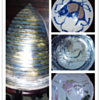Posted 12 years ago
 kerrycz
kerrycz
(42 items)
I would love to hear from any one that does not agree with their findings.
Here is the article written up by a local Auction House that describes this piece. There are two more I will be putting on as well.
Pigmented Structural Glass
Posted By whatsitworth on May 26, 2011
A nice couple recently brought three framed panels into one of our weekly appraisal events and stumped us all. The oak framed items were heavy – perhaps twelve or fifteen pounds each – and opaque. The decorative elements were not painted on but were carved out but light did not penetrate the carved areas either. None of us had seen anything like it until I remembered seeing something similar in the ladies’ powder room at Oakland’s fabulous Paramount Theatre.
Built in 1931 and designed by San Francisco architect Timothy Pflueger, the Paramount is a testimony to Pflueger’s creativity as he mixed the disparate talents of mosaic artists, muralists and lighting designers. Inspired by the 1925 Exposition Internatioanle des Arts Decoratifs, Pflueger was unafraid to employ new techniques and materials into his buildings. One of these new materials was pigmented structural glass.
Pigmented structural glass was first developed right around the turn of the last century. It was considered to be an inexpensive alternative to marble and was marketed under the brand name “Sani-Onyx” as a germ free and easy to clean building material for exteriors and interiors. About a decade later the Penn-America Glass company began to produce a luminous white glass marketed as “Carrara Glass” used in restaurants, operating rooms, kitchens and bathrooms.
By the 1930s the Vitrolite Company was producing pigmented structural glass in any number of colors and shapes. The glass was hugely popular in Art Deco period construction because it could be molded in shapes and curves, could be used to re-clad and update and existing exterior, and could be decoratively etched or carved for interiors. Additionally, companies marketed structural glass panels to homemakers for rolling dough and the Maytag washing machine company lined its washer tubs with Vitrolite.
Framed individual Vitrolite panels were also sold to homeowners who wanted a little modernity in their lives but did not want the coolness of entire glass walls. What Paul and Kerri brought in were three of these framed panels. The one shown here of Diana and the stag in moss green glass was likely made right around 1930.
Michaan’s Auction owner Allen Michaan is no stranger to Art Deco interiors and architecture. (Allen owns and restored Oakland’s wonderful Grand Lake Theatre.) I showed the panels to him and he immediately agreed with my thoughts. Between the two of us we determined that the set of three etched panels – two green and a black – would sell at auction with an estimate of $800-1200. Look for these great examples of American decorative art in our May sale!
Notes on last week’s article about machine made versus hand loomed Paisely shawls:
I did not know this until I read a New York Times article this morning, but March 11th was the 200th anniversary of the first Luddite riot in northern England. Led by displaced textile worker Ned Ludd, a crowd of rioters attacked the automated looms and knitting machines that had automated so many of their jobs. Rioting continued at textile plants into 1812 and spread throughout England. Eventually, loom destruction was deemed a capital offense and at least 17 rioters were executed!







could you post a larger image? this one is hard to make out...
I assume once they figured out it was a vitrolite tile, the rest was easy for them. I typed in etched vitrolite panel and one of the first things that came up was an etched owl in vitrolite. It advertises it as being from the 1920's/1930's art deco. Asking price is 595.00...posted in Febuary. I'm sure they were able to collect a little more info to get a good appraisal.